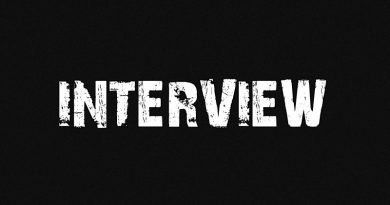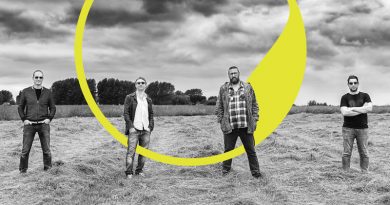In Search Of Tone: Tony Reed Of Mos Generator & Big Scenic Nowhere
Tony Reed is a master of his craft. Anything he sets his mind to he accomplishes to the fullest extent. Just like Jake from Elder Druid, Tony Reed is a role model that people can look up to, not only in music, but life in general. Whatever he sets his mind to he carries out with aplomb and will even go the extra mile to invent something to fix a problem.
I’ve learned a great deal from Tony in the few conversations we have had and he always takes the time to answer any questions, even before our interview! He is an awesome guy and one of the reasons I keep picking up the guitar every day.
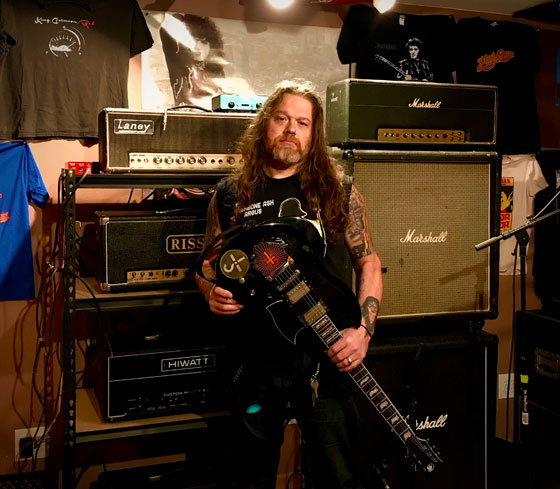
I always love reading your liner notes and posts on social media about the backstories on songs and how they are recorded, so let’s get started, what amps are you currently using?
I find that my 1969 Laney Supergroup is the amp I go to in the studio the most. That’s the one that gives me all the range of sound that I personally like and if I do want to use a pedal, which is not typical for me, that’ll take them well. I have a 1980 Hiwatt DR103, it sounded brutal, but sometimes taking those older amplifiers out on tour is not the best idea because they can blow transformers. Those old amplifiers don’t get that nice gain until they’re turned all the way up, so if you tour for five weeks with the amp turned all the way up every night, when you got something that’s 40 to 50 years old, you’re going to be blowing transformers left and right. In the studio it’s usually the Laney or the Hiwatt, or this amp from the 70s I have that’s called Risson that I toured with a few years ago. I also have a clone of the preamp built by Ben Verellen to use in Europe as the tone is so unique.
I’ve also got some Marshalls like a ‘74 100 watt, ‘77 50 watt, an early JCM 800 and then a bunch of other weird stuff like an Ampeg VT 22, Vox AC30, some Laney Combos and live its the Rola that I have. It’s the Reed HW 100. I got an endorsement from Derrick at Rola and found that I really like to take these amps out on the road because I don’t have to crank them all the way up. They’ll get to the volume I want with the grind at a lower volume but they’re just so well-built that I know that it’s gonna work out every night. I don’t feel like it’s under duress. Sometimes you can just smell when an amp is ready to blow up.
In the studio it’s usually the Laney or the Hiwatt, or this amp from the 70s I have that’s called Risson that I toured with a few years ago….
Another perc is Derek lives about 25 minutes away, so if I want my amp repaired I don’t have to send it off somewhere weird. I do have a great repair guy that only lives about five minutes from my house that works on all my other amps but as an endorsee I take my Rola to him. I’ve been endorsed by Laney and Hiwat and would have to send my amps away to repaired so having somebody that builds such great amplifiers live that close to me is amazing. Like I said that’s my live amplifier for sure. I got a 1×12 combo from him as well. Basically for studio its the Laney Supergroup and everything live is the Rola.
Do you feel you can get similar sounds from the different amps. Does your sound change that much going from the Laney in the studio to the Rola live?
Only a little bit. I have all these amplifiers because they have unique sounds and the Rola seems to possess a little bit of everything, but if you put it under the microscope it’s not enough to replace it in the studio, but on stage it’s enough to get what I want. On stage I use more gain than in the studio because I’m singing and playing so I need a little bit of assistance, especially with the faster stuff and singing. I don’t have to concentrate as much on my picking and my fingers will do the work with what the amps giving me.
So with your clean and distorted tones coming mainly from your amps, what pedals are you currently using?
Zero.
Wow, that’s interesting.
I don’t use anything on stage and for years I wasn’t even using a tuner. I would just play my guitar right into the amp. Usually the band before us I would watch and get a feel for the crowd and what they might like from us. I’ve never written our set list out. I will just go by what would these guys like to hear from our catalog and then I sing along with the band that’s playing to warm up my voice so I’m using their volume to do my own warm ups.
About 10 to 15 minutes before they’re done, I go back stage or to the side of the stage or even at the merch table where I’ll play my guitar, tune it, pull all the strings, so this way it’s used to the climate in the room. Rooms can be very humid or we may have just driven over a mountain pass, so my guitar is tripping out. You’ve got to give it a little bit of attention before you get on stage. I have found some instances where I’m on stage tuning and that’s maybe not the most professional thing, so I put a tuner into my chain.
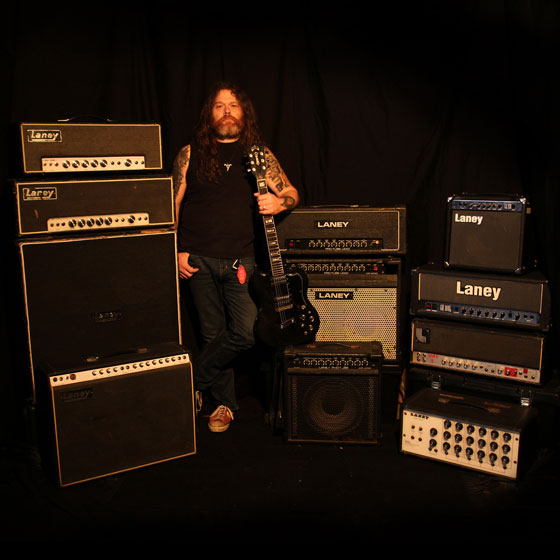
I want my guitar to get to my amp the easiest way so if something goes wrong there’s less to be wrong. It’s either the cable, the amp or the guitar. Not a plethora of pedals that’s causing me to stop playing and figure out what’s going on. I keep all of my gear in really good shape. I bring soldering iron’s on tour and all the stuff that can fix any problems, even extra wheels for the cabinets and stuff like that. I’m my own roadie, so I have to be prepared for anything and oddly enough I just started bringing two guitars. I’ve never had a back up guitar before, I don’t know why, but I figured I should probably start doing it.
I’m not opposed to pedals, but I am opposed to their misuse. You have a wonderful amp and to put something in front of it that’s altering its natural tone usually bothers me. I like the amp to do the work and I like to be as pure as possible, but then again, my guitar sound is a very 70s kind of hard rock tone. It’s not sludgy or needing a fuzz or anything like that. Sometimes I’ll us use a pedal on record if I need something that has crazy grind as I have about 40 in the studio, and there’s a few go to pedals I really like if I need to add some effects, like a vintage MXR Phaser 45 which has a rotary sound.
I have a Leslie Rotating Speaker that’ll sometimes use in the studio and Creepy Fingers make some cool stuff too. I’ve got the Tony Iommi pedal, and I really like that with the Laney Supergroup and the OCD is something I always carry with me in case I have to use somebody else’s amp. An OCD pedal seems to morph into what you want, same with the Iommi pedal, but I think the OCD is something I can really trust in an emergency.
I’m not opposed to pedals, but I am opposed to their misuse. You have a wonderful amp and to put something in front of it that’s altering its natural tone usually bothers me…
So you only use one guitar on tour, with a recent addition of a back-up. Are these your main guitars or do you have an arsenal?
I have about 30 guitars. It’s like amplifiers. If you’re looking for a certain sound I can walk downstairs where I have them stored and labelled so I know which is which, so if I want a Rickenbacker guitar sound, like a Tom Petty jangle, I grab one of those. I don’t use them that often but I got it there if I need it. On tour for years now it’s been the LTD Viper 400 and I felt like over the years I’ve had to defend that guitar. I have a variety of Gibson Les Paul‘s, 335’s, a 135 and Fender’s. I have a 1970 Gibson SG, but I feel like the LTD is perfect on tour, especially in Europe, so I wasn’t taking one of my really expensive guitars on the airplane.
This guitar stands up to a lot of the abuse I give them on stage. I’m sweating on them, Jäger getting poured and I do these mods where I drill extra holes to add another knob, something I don’t want to do to guitars that are expensive. Sometimes I’ll replace one of the tone knobs with this modification. So the Viper 400 I used a lot live, but recently I’ve been playing Reverend and I’m really liking them.
The difference is the LTD is 24 frets so I’m used to being able to get way up on the high stuff and the Reverend allows me to get pretty high as the horns are pulled back. But I’m really starting to like the way they feel, like the Rola amps, the Reverend are well built with high-quality electronics and they put the volume knob right where I like it. My favorite studio guitar is a Gibson ES 135 semi hollow body, you wouldn’t think that but when I play it on the beginning of Shadowlands, it’s a 135 with a Hiwatt and that’s such a pure guitar sound. There’s nothing else in the chain, it’s just that the guitar sounds so wonderful and I used to play live with it but it became too large to handle and you can’t get into the high notes that you’re looking for. I like the SG shape because I can get all the way up without bumping into anything. I would say that in the studio, the 135 or I have a 1972 Guild S-100 that I like in the studio quite a bit. It’s really thick and VH1 pick ups have a unique tone so the high notes and solos still have girth. It’s really neat with a Risson amp because it makes your high strings sing and is killer sounding.
I’m contemplating moving to the Reverend on the road, but I just brutalize my guitars a lot. The LTD has become such a piece of me, moving on from that would be weird, we’ll see. I think the Reverend’s also have a neck that feels nice. I’m starting to like a wider string spacing over the LTD and I’m finding I can get around the guitar quicker.
You mentioned modding your guitar. Can you explain what mods you’re doing?
Since I use no pedals and there’s drastic dynamics in Mos Generator’s music, I have to turn down my volume a lot, there’s no hitting a clean or dirty channel. I have to do it with the volume knob, so live, I’m working it a lot as sometimes it needs to go to where it’s barely open, as fast as I can, so I’ve often turned it off by accident. Now I’ve fitted a secondary that acts as ‘master volume’. I don’t really know what it’s called because I’ve never heard of anybody doing this, so if I turn my volume all the way down, I can turn the ‘master volume’ up. If both are all the way down it’s closed and there’s no signal, but if I take the secondary volume and turn it up, it opens up the signal in my main volume, even though that’s turned all the way down. So if I have that secondary volume opened up to where I wanted the minimum volume, I can turn the volume all the way down quick, but the signal is still coming through wherever I set it, then I don’t have to worry about accidentally turning it off.
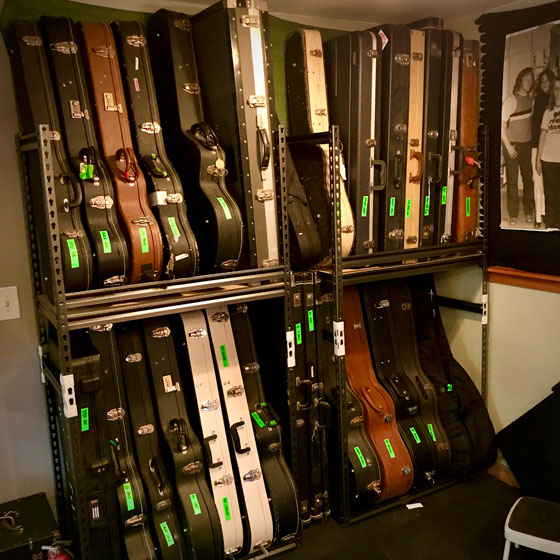
Certain songs have different settings. I wanted the secondary volume to be a click switch so I could say ‘OK this song is click number three’ but then I thought that was too much, so I have different settings for each song. This way it doesn’t make me have to think about that part. I’m sure somebody has thought of this before, but I came up with it on my own through experimenting. My guitar guy was like ‘dude what is this!’ I’ve had people come and take pictures of it, I’ve talked about it with guitar builders and people want me to open up the back and take pictures and would ask what ‘did you do?’. I didn’t know it can do this, I just fucked around with it until I got there, so I got lucky because I’ve had things built to try and do that to keep me from having a pedal in the middle as I’ve tried to use them but it’s bothersome to me. so that’s the mod that has to go in any guitar that I’m playing live.
Will Reverend do that for you with the endorsement?
No, I’m going to have to figure that out because they do a three figure knob configuration that may not work for me. They do have a bass roll off knob, which is cool as they have a volume for each pickup, a tone knob and a bass roll off which is neat because if you want to make your heavier tones more like a Strat sound, it’ll give it that feel. I’ve been using it where I turn the bass all the way down, turn the low-end on my amp up and get a nice chunky sound, then I can turn the bass up on the guitar and it gives it this really heavy thick low end that’s not tight anymore. But I like a tight guitar sound and if I pull that thing up it’ll give it that loser sound because some of our songs have that fuzz or heavy thick sound. So I’m not sure what to take out, or just knock a whole new knob in there.
I’m not worried about what my guitars look like. It’s like buying a 4 Wheel Drive truck and worrying about getting it dirty [laughs]. It’s like buying a pick-up and not wanting to take it out to the woods and make a mess and all my guitars are like that, they don’t need to be taken care of, especially the live ones. If I were to do a signature model, I would want that modification and make it unique.
I’m not worried about what my guitars look like. It’s like buying a 4 Wheel Drive truck and worrying about getting it dirty…
I haven’t played any huge amps, only small practice amps. I was curious what kind of practice amps you recommended and use?
I have tons of little combos. I have Laney Combo that I like a lot and it gets pretty high gain and a 1×10 that I can move to other rooms without it being a big deal. I even like those Mini Marshall’s as its enough for me to just run riffs through, but with the exception of those, my practice amps are still tube amps. But if I’m sitting there trying to learn something, I’ll do a lot of acoustic playing, especially when I’m sitting on the couch. I’m doing stuff right now because someone’s having me play on the radio a live acoustic set so I’m having to go through stuff and remember how to play it, but yeah any 1×10, 1×12 amp is perfect.
Since you’re involved in many projects, Mos Generator, Big Scenic Nowhere, and your solo acoustic album, what is your writing process like and does it differ between projects?
Big Scenic Nowhere is completely different to Mos Generator or even my country rock band, that’s super fun to do, and solo stuff because I’m not the only songwriter. So that technique is where myself, Gary [Arce], Bill [Stinson] and Bob [Balch] jammed for three days, recorded a bunch of long jams and then I brought them back to my studio, I’m playing bass on those tracks too. I’ll then edit them down and sometimes completely re-constructing because they’re long 15 to 30 minute jams to make songs and then I add vocals. Sometimes when you add vocals, it changes things or when we have a guest, for example Per [Wiberg] from Opeth, playing keyboards and he’ll throw in melodies. I’ll hear that back and I’ll think ‘man this is really cool’ and I can build on that.
That’s a completely different thing to Mos Generator because that’s me riffing on my phone and bringing that or riffing in the jam room and we’re all just playing and I’m recording. I record rehearsals a lot but here’s the problem, I’m from the Seattle area and Jono Garrett [drums] lives in Texas, so even in the best of times we can only write when he comes up, which he usually does right before we’re gonna leave for a tour. We might spend three or four days before the tour writing, then I put it together and the next time he comes up we record it, or sometimes I’ll use the demos that we did before the tour and that’s what ends up on the album.
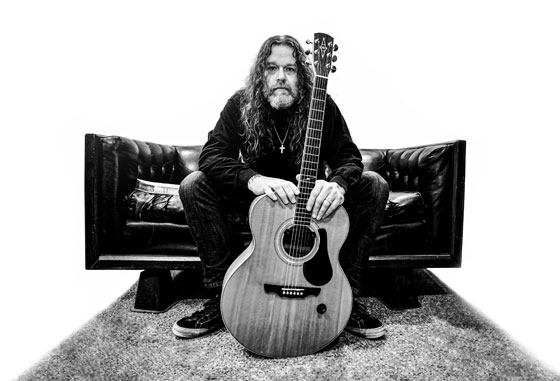
Now with COVID we haven’t been in the same room for a year and a half, we did some shows with Clutch and Red Fang and when he went home, only a few months later, all this started. So my writing process generally comes from riffing on the couch and then a lot of the times I build a song in the studio and let them hear what I came up with, or I’ll do long jams and re-arrange them into something that makes sense, then we will re-record it.
I have to do a lot of making music remotely these days. For me, making music starts with the riff, for example, the acoustic album, many of those songs especially, side 1 of Funeral Suit, are literally an hour old. I recorded the acoustic parts, then wrote lyrics and sang them right there. I decided not to re-record because that freshness is not homogenized. What that song means just showed up and I had no time to think about it. I’ve learned how to do that over the years. I used to be a seriously intense perfectionist and it almost ruined many recordings because the perfection part took all the soul out of it. I’ve learned how to let the mistakes and spontaneity be part of the songs and I think it makes for better records.
I can understand that now, but couldn’t when I was young, even on stage mistakes were not allowed. That’s ridiculous, there’s no such thing as a gig without a mistake, let alone a whole bunch of them, for me anyway and it’s weird sometimes when you get off stage, think that was terrible and somebody that knows you, has seen you loads of times and says that’s the best time I’ve ever seen you guys. I like that, so you never know man.
The writing process is strange and there’s no rhyme or reason to it a lot of the times, and the process isn’t always the same. Luckily enough at my age, which is 52, I’m able to still be really creative and make music every day. I do something every day with music which of course, that’s my job, but I use that time mastering an album or mixing somebody’s album as well. If I get kind of burned, then my own stuff is sitting right there and I can work on that for a little while, and then come back to that, I do that a lot. I’ll just record little bits of things for 20 minutes, then go back and continue. Or I’ll go downstairs and do something in the garage or whatever. Take little breaks. I feel lucky that I can still be super creative it’s like I have something to prove to myself. I need to leave a legacy behind so I just keep doing it.
I used to be a seriously intense perfectionist and it almost ruined many recordings because the perfection part took all the soul out of it…
Well I hope you continue doing it.
Yeah there’s no stopping it. I’m working on Big Scenic Nowhere right now. Mos Generator plans on doing three sessions this year. Jono plans on flying up for 10 days at a time and will do three writing sessions and one recording, even though we record during the writing sessions, the third one is like ‘let’s get down to business’ type of recording. We’ve never done it like that before. It’s always been ‘you’re here for a couple of days let’s just write whatever we can, lay it down and then next time you come up we’ll write more.’ Now we’re going to do it with a little more thought process. I’m pretty excited about writing some new Mos Generator.
I think last year was my most prolific release year. I think I was on twelve albums. Three of those were Mos Generator material and one was a best of album, which doesn’t count, because those are all done, but the other two records were material that are just sitting in the vault. So we can still be productive and still release records even though we weren’t making music. Now getting back to this, I’m really looking forward to new stuff for sure.
That’s really exciting. The vault stuff is outstanding, but new Mos Generator music is definitely something to look forward to.
Yeah, that’ll be super fun and I guess what I was getting at was that we’re doing all the writing for Mos Generator. It’s just us in the room playing. I’m not really taking completed arrangements to them, I may have some phone riffs, but this time we’ll write it all together.

Spontaneous Combustions is a fantastic album. I was reading your notes, is that how those songs were recorded?
Yeah, that one was literally recorded in three hours. It’s not written, it was just us jamming, so it’s live right out of the gate. We may have had an idea, but after the first 30 seconds we were free because we do free forming sections on stage also, so we’re aware of how to lock in with each other. You’re absolutely right on the Spontaneous Combustions. I did put vocals on some of them, but that was later. Those were arranged as we were playing and sometimes I’d be mouthing to change from B to C, because I knew what I would probably sing later. Vocals weren’t live, were done later but not knowing what they were going to be. Now, when we do these writing sessions they’ll be arrangements for real songs and not spontaneous, unless it works and we can’t play better, then that’s how it’ll stay.
How do you create unique music without repeating yourself or others?
You can’t not repeat others. There’s no way and I don’t really try to go out of my way to be different. As a songwriter, I just try to funnel as much musical knowledge as I can into a hard rock foundation. When the band was formed in 2000, Sean and Scooter, the original rhythm section, had already been playing in a band for ten years before Mos Generator formed. We decided to go back to our roots and make a hard rock band. We’re going to always manage to keep the band in this box. Whatever you put inside the box is one thing, but the foundation will always be 70s rock based.
I have a massive wealth of musical influences, I’ve changed my musical directions so many times over the years and I still try put fun things into the sound to make it unique. There’s little things hidden inside songs that people would never guess. For example, there’s a song on Electric Mountain Majesty called Enter The Fire that’s a mix of Temptations and the B-52 influences, if you listen to Planet Claire by B-52s you’ll see that I ripped off that whole line of guitars or the rhythmic pattern from Papa Was a Rolling Stone by The Temptations. Although it doesn’t sound like the Temptations, that influence is completely there. The same song has the cello at the beginning and if you listen to the end of Good Vibrations by the Beach Boys you can hear the chugging cello sound that’s a metal thing, but it’s played on cello and I have a guy who I went to high school with who is now in the Seattle Symphony Orchestra. I had him come in and do those tracks, just like Good Vibrations, so that song is three things mixed into a hard rock track. It’s really just kind of funneling everything into one place, but making it hidden enough that it’s not obvious stylistic changes.
You can’t not repeat others. There’s no way and I don’t really try to go out of my way to be different…
Those kind of things are all over our records and unfortunately, in this day and age when information is going by so fast, a lot of people can’t and won’t take the time to explore records as much as they used to. Even some record labels you deal with, you get about three or four days, maybe a week of attention from the PR promoting a record, then the next one comes in and that happens with everything. That’s just the way things are now and maybe that’s why I make so much music.
For me it’s funnelling all the influences to try and keep it fresh, and I feel like we’re gonna make some serious changes on the next Mos Generator record because we’re just a hard rock band with avant-garde like tendencies. I feel over the years we made it OK to do weird stuff. We made a hardcore album couple years ago with songs that are a minute and a half played extremely fast. They’re all songs I wrote when I was about 18 when I was in a hardcore band. When we recorded them in Mos Generator, they learnt and recorded them in four hours, we even play those songs live sometimes, they’re really fast and total punk rock hardcore, people trip out on that. We played this doom festival one time and all these bands were super sludgy and slow, so I said lets open with the hardcore stuff and people are like ‘what the fuck is going on’ [laughs].
We also had an album, The Firmament, where we had extra members play, it was filmed in an airplane hanger and we played all the psychedelic stuff. I played keyboards, acoustic guitar and electric guitar and there’s even a gong it. It was a different sound than our other stuff so I have tendencies to move around inside within ourselves and do a little project within the band, a lot like this band Motorpsycho.
They’re my favorite band that exist at this point in time. They make wonderful music. It’s a very wide range, they do a lot of what I’m trying to do and when I first heard them, I was completely in tune. They were doing exactly the same thing I was working on. We don’t sound the same, but they’re doing very unique music in a hard rock format. They’re from Norway and an amazing band. I actually got Bent [Sæther] to play bass and sing on a tune we did last year, so that was a big deal for me. It’s really rare for me to find modern bands that I enjoy, and I work with a lot of bands and there’s cool music coming out, but I’m not sure people are really moved by a lot of music. Like really moved by emotionally other than ‘fuck this is heavy’.
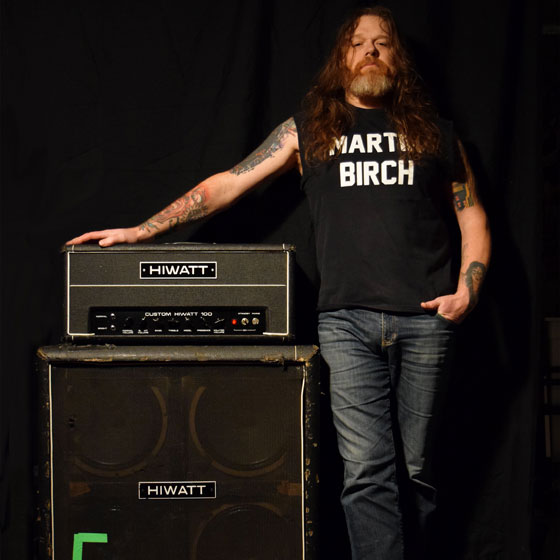
There are other emotions involved and strong lyrics over the last few records. With Funeral Suit, that’s me looking into the really shitty parts of myself, things that I don’t like and things that are really hard to get rid of, it’s me telling everybody I’m not super cool, that’s a real exorcism. The last few Mos Generator records also have those lyrical tendencies, but you can’t hear them as much because the music is obscuring the lyrics. On Funeral Suit there’s no doubt I’ve got something going on as there’s a heavy lyrical content and it’s the loudest thing on the record.
I’m a fan of lyrics that go for the human condition and real things, especially as you get older you find that things matter more that didn’t when you were younger. Like death and aging is a big deal because once you get to a certain point you think ‘I only have X amount of years left’, that’s really scary, especially if you haven’t achieved what you wanted to. I’m getting pretty heavy in my interviews lately [laughs].
I get that and although I’m 33, I work in a hospital, see a variety of patients and see how life can and will turn out. Plus with 2 kids I feel older than I am [laughs].
[Laughs], for sure, that’ll do it and it starts to creep up, even in your mid 20s. My son is 26 and he’s going through that right now. I remember when I was his age I started to ache and I was like what the hell is going on. That’s about the time your body starts to go, even though it’s only slightly, you’re wondering what’s going on and then it just kind of goes downhill from there. I have a positive outlook on life with everything I’ve been able to do which I’m thankful for and appreciative of. I’m a lucky person and I keep a good outlook. I think that really helps but sometimes it’s a little harder than others.
That’s where music comes in so you have a source to get those feelings out.
Yeah, that’s really my life, that and my family, you need something to keep you excited in life and I have a lot of it.
[The Late Great Planet Earth] is my proudest moment because it sounds like it did in my head when I started writing it…
Is there a song, or part of a song, that you’re particularly proud of writing?
Well, if you want to call it one song and twelve segments, The Late Great Planet Earth, which was our second album and although it’s broken up into twelve songs, it’s really one song. That is my proudest moment because it sounds like it did in my head when I started writing it. It’s very intense and that whole record is crazy and layered to the hilt. We can only really play two parts of it live because it’s too much. But the feel retains itself all the way through. It’s a concept album and over the years has always been the thing I named as the favorite thing that I’ve ever done.
That being said, it’s also the furthest away from being a part of me. When you listen to it, you don’t get what Tony Reed is about. Lyrically it has nothing to do with me personally. Shadowlands, on the other hand, is a song of recent years that I think is really the definitive Mos Generator song because it has so many elements in its structure and has many different types of influences.
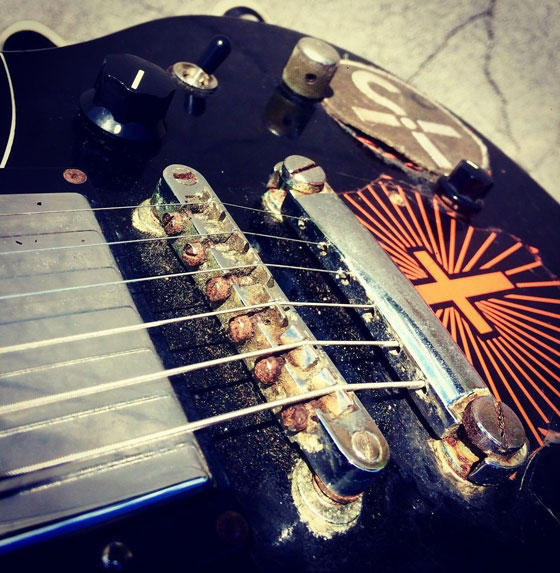
The lyrics are really cool and the arrangement flows through all kinds of changes without being apparent that that’s happening. Everybody’s performance is great, the sounds are all wonderful and everybody just hits on the mark completely. My mix is great, which is not always true and most times I don’t even listen to the records. We will send the finished records to the label and they’ll send us back a copy and I don’t even listen to it. I’m like oh a new record and put away [laughs]. I can’t listen back because I’ll think I could’ve done this or that better. But Shadowlands when I heard that I thought ‘man that’s the cut, that’s the track’. So if I have to name one, Shadowlands would be the definitive tune in the Mos Generator catalog for sure.
I have many off days and often will put the guitar down for a few days. What do you do if you have an off day and how do you get inspired to play again?
Definitely, you need to know how to operate as yourself and not get too down. Realize you’re not there today and that’s OK. I do that with drum tracks a lot. Sometimes I might try two or three major attempts at getting a drum track. I’ll just walk away from it and just say ‘OK, I know I can get this, but I’m not in the zone right now’. Basically, I’ll walk away from it and wait for the inspiration. You’ll know when you’re going to get it because if you have to work on something too much there comes a time where your never gonna get it. Taking some time, whether it be 10 minutes, a couple of days or whatever, or just moving on to something else is helpful and just knowing yourself and not letting it get in your head.
I’ll walk away from it and wait for the inspiration…
It’s a been pleasure and I appreciate you taking the time to speak with me.
Hey man, thank you. I like talking about it, I like talking about playing music, I like talk about music [laughs]. Sometimes the interviews go on for way longer than scheduled because we had a nice talk about music. I’m a full music nerd and love nerding out on records. That’s always been my thing. I’ve been collecting records since the early 70s when I was very young. I managed to weed out about 1000 records from my collection over the last year. I opened a record store with a guy in town. I buy records even though I’ve already got them, or if I don’t want them, I still buy them at the thrift stores and sell them at record conventions. Now that I got the store, I just put them in there. As you get older, you’re thinking I haven’t listened to this album in ten years, I’ve got to get rid of it.
That’s awesome. I love how you immerse yourself entirely in music because it’s your passion and people have plenty to learn from you. Thanks again for sharing!
Label: Argonauta Records | Heavy Psych Sounds | Ripple Music
Tony Reed: Bandcamp | Instagram
Mos Generator: Facebook | Bandcamp | Instagram
Big Scenic Nowhere: Facebook | Bandcamp | Instagram
Interviewed by: Josh Schneider

